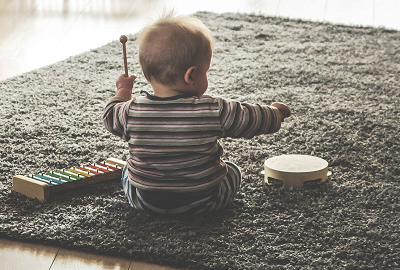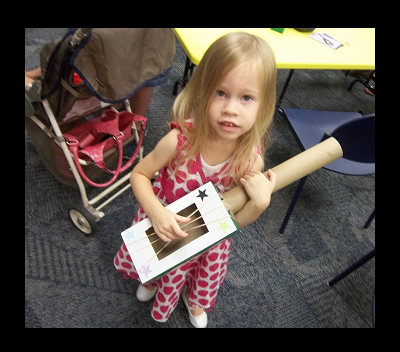Website Redesign Coming December 1-5!

Singing with your child is a fun way to help your child get ready to read. Music helps children hear the smaller sounds of words and builds vocabulary.
Children develop listening skills and hear the rhythms and rhymes of language.
Children get an understanding of the smaller sounds in words because singing slows down language, and often songs have different notes for each syllable.
Clapping or playing instruments along with rhythms improves fine motor skills and also helps children hear syllables.
Children learn new words and concepts they wouldn't normally hear in everyday conversation, adding to their general knowledge.
Music helps children remember things longer because it activates a different part of the brain than regular spoken language.
Children learn best by doing activities with you. Make it fun and don't feel self-conscious about your singing voice – your child loves your voice and loves hearing you sing!
Sing anything you enjoy and are comfortable with: traditional songs, nursery rhymes, and any song you like, including rock or pop! If you enjoy it, your child will, too.
Sing throughout your day: learn or make up songs about routines, like cleaning up or brushing teeth – songs make ordinary tasks more fun!
Sing songs with rhyming words, silly words, and long stretched-out words.
Use the language you know best. They need to hear you in the language you're most fluent in.
Need song ideas? Check out our catalog or stream kids' music from Hoopla.
Get up and move! Children develop motor skills as they clap, jump, twirl, and play instruments. (You can make simple instruments: a plastic bottle filled with rice becomes a maraca shaker, a round oatmeal container becomes a drum, and a rectangle tissue box wrapped with rubber bands can be a guitar!)

Sing a book! Check our Songs and Rhymes section of picture books or make up a simple tune for one of your child’s favorite books.
Sing songs again and again (and again) – repetition reinforces learning!
Examples of using singing to build early literacy skills:
Are there any new words in a song? Talking about their meanings afterwards will build vocabulary.
Sing songs slowly: songs often break up the syllables of words by assigning a different note to each, as in "Are You Sleeping?/Frère Jacques."
Sing songs quickly! Changing up the tempo will help children hear the small sounds of words differently. For example, you can "Row, Row, Row Your Boat" gently, then swiftly down the stream . . .
Make up new verses to familiar songs like "The Itsy Bitsy Spider" together; this develops narrative (story-telling) skills.
Sing a familiar song to a different tune: it will emphasize the smaller sounds even further. For example, sing the Alphabet song to the tune of "Mary Had a Little Lamb." It breaks up the letters LMNOP so your child can hear them individually.
Sources:
Saroj Ghoting
Every Child Ready to Read 2nd Edition
Storytime Katie: Babies Need Words Every Day
Library Bonanza: Early Literacy Talking Points
Story Time Secrets: Babies Need Words Every Day